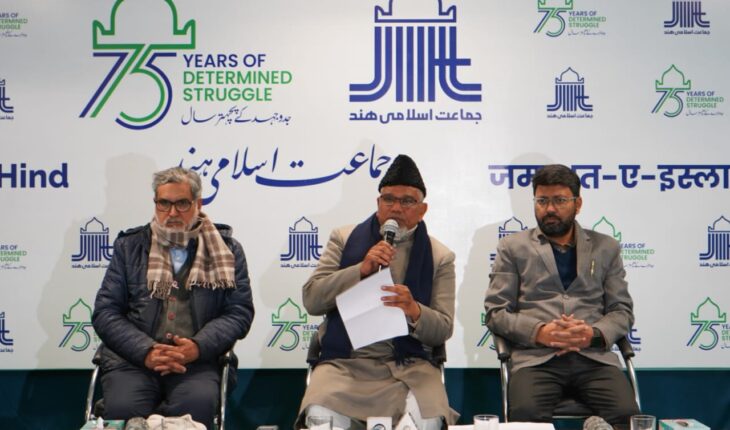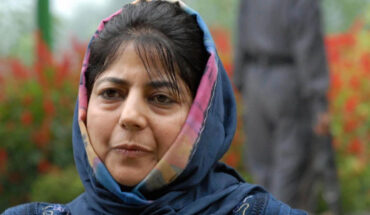Voices concerns over communalism and growing insensitivity to anti-women crimes
New Delhi : Jamaat-e-Islami Hind (JIH) has welcomed the decision of the Supreme Court staying the order of the Uttarakhand High Court to evict thousands of families in Haldwani because of a land dispute with the Railway authorities.
Addressing the media persons today here at its headquarters, JIH Vice President Prof. Mohammad Salim Engineer has demanded that the demolition drive be rolled back and an amicable settlement is reached between the Railway authorities and the people through negotiation and dialogue.
Speaking at the monthly press briefing, Prof. Salim hailed the apex court that its stay order would strengthen the trust of the people in the judiciary, which stopped thousands of families from becoming homeless. He endorsed the comments of Justice Sanjay Kishan Kaul and Justice AS Oka that “there cannot be uprooting 50,000 people overnight… It’s a human issue, some workable solution needs to be found. It may not be correct to say that paramilitary forces have to be deployed to remove people who have been living there for decades.”
According to reports, over 4500 homes including 4 government schools, 11 private schools, a bank, two overhead water tanks, 10 mosques, 4 temples, business establishments and shops are likely to be targeted in Haldwani.
Disapproving of the proposed demolitions, the JIH leader said that even though the authorities had the backing of the Uttarakhand High Court Order, evicting such a large number of people was completely inhuman and against all norms of justice and righteousness.
Recently, a fact-finding team led by JIH Secretary Malik Mohtasim Khan, Senior Journalist, Prashant Tandon, Association for Protection of Civil Rights’ (APCR) Secretary Nadeem Khan, SPECT Foundation’s Laeeq Ahmed Khan, and JIH Assistant Secretary Inamur Rahman visited Haldwani and filed a report detailing the situation there.
Sharing the fact-finding report with the media after the visit, Nadeem Khan highlighted certain gross anomalies in following the due process. Nadeem mentioned that none of the eviction notices issued to the petitioners under the Public Premises (Eviction of Unauthorised Occupants) Act, 1971 were addressed to them individually as mandated by the legislation and it was addressed to ‘all unauthorized occupants of Railways land, adjoining to Haldwani Railway Station from Km. 78/0 to 83/0 Haldwani’.
Voicing concern over the growing insensitivity to crime against women by society, the JIH Vice President lamented over the recent incidents. Citing several such incidents including the tragic death of Anjali Singh who was dragged by a car for almost 12 km in the country’s capital, a woman stabbed 51 times by her stalker with a screwdriver in Chhattisgarh’s Korba district, a 17-year-old girl attacked with acid on her way to school in west Delhi and 27-year-old murdered and hacked into 35 pieces, allegedly by her partner, in New Delhi, Prof. Salim said that all above incidents point to the growing apathy and disregard of society to the inviolability of a woman’s life and the dignity accorded to her by her Creator.
Stressing on the need to reform the society by changing its outlook towards women, Prof. Salim asserted that it should begin at the level of school education itself. “Islam accords great respect and esteem to women and it elevates the position of women in society and gives utmost precedence to her security, well-being, education and status at home and in society,” he added.
Expressing grave concern over the growing communalism in Karnataka and other states, the JIH Vice President said, “this is especially worrying as assembly elections are due in Karnataka and very soon at the national level. From opposing the wearing of the hijab in colleges, disallowing Muslims to set up stalls and shops in Hindu festivals and fairs and attacking Christian congregations – there seems to be a free rein to the peddlers of hate and bigotry in Karnataka. The move to adopt anti-conversion law, unveiling the portrait of Veer Savarkar in the Belagavi Assembly chamber and denigrating Tipu Sultan – appears to be a desperate attempt to practice communalism for reaping political dividends.”
Commenting that the governments in other states are also busy playing the politics of hate and division for electoral gains, Prof. Salim said, “in Assam, the Deeni Madaris are targeted and a delimitation exercise is being carried out in a communal manner to dilute the “Muslim” vote. In Madhya Pradesh, the number of communal incidents is on the rise. Taking a leaf from the government of Uttar Pradesh, the MP administration has become active in the selective demolitions of houses belonging to people from the Muslim community. Incidents like the pre-planned communal violence in Khargone on Ram Navami are like a template that can be replicated again as election times nears so that the electorate can be polarized and the majority community vote is consolidated in favour of the party that dares to teach the minorities a lesson.”
Calling the trend of majority appeasement through minority baiting not in the national interest and a threat to the democracy and constitutional values, Prof. Salim urged political parties and the electorate to reverse this trend.
Expressing a sigh of relief over the New Year, the JIH Vice President said that the year 2022 was a welcome relief from the pandemic years of 2020 and 2021, with things returning back to normal. However, he expressed concerns over the poor ratings and rankings that India received in various indices such as the Human Development Index, Global Environment Performance Index, World Happiness Index, Global Gender Gap Index, Global Hunger Index, Corruption Perception Index etc. Prof. Salim said, “the government continued to ignore the vital sectors like health and education with budgetary allocation of around 2% of GDP and 3.1% of GDP respectively. For the Muslims of India, however, the past year was no different than the previous years as the ruling dispensation with the help of its affiliated organizations, government agencies and the media were out to make Muslims “politically-invisible” and spread baseless allegations against them and their religion. Democracy continued to be under threat and there were frequent communal conflagrations. But the judiciary continued to raise hope in the supremacy of law. Hopefully, 2023 will ring in better times for our country.”




